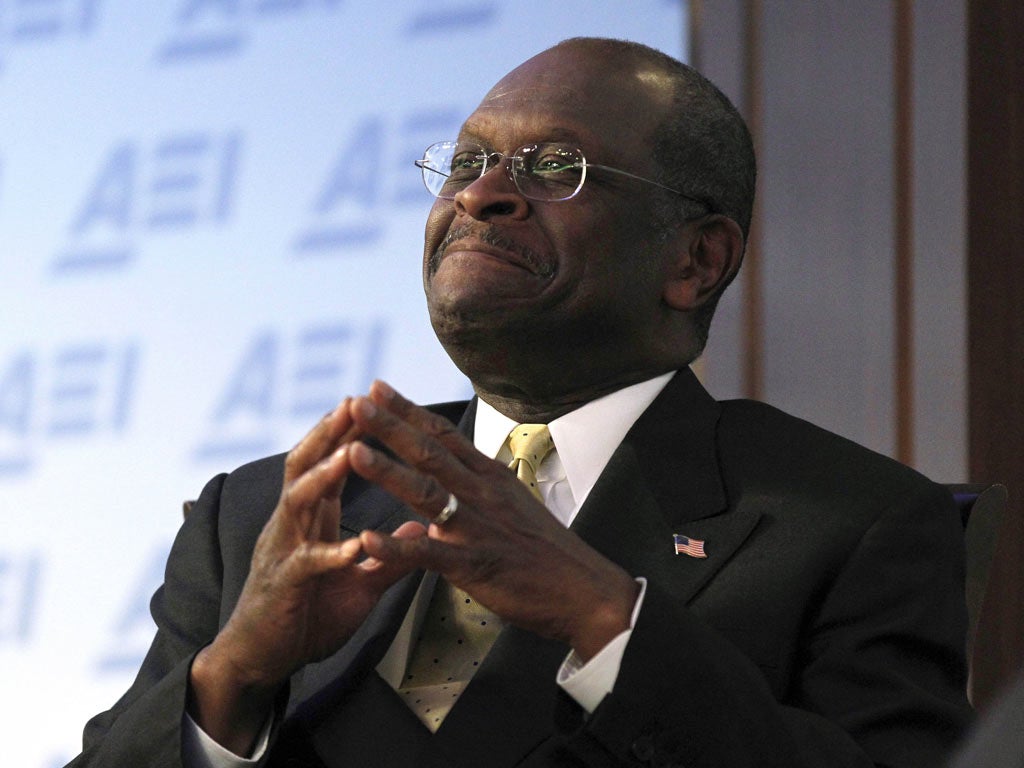Sexual harassment claims see Herman Cain slump in polls
Pizza mogul Cain's popularity sinks after sexual harassment allegations, poll shows

Your support helps us to tell the story
From reproductive rights to climate change to Big Tech, The Independent is on the ground when the story is developing. Whether it's investigating the financials of Elon Musk's pro-Trump PAC or producing our latest documentary, 'The A Word', which shines a light on the American women fighting for reproductive rights, we know how important it is to parse out the facts from the messaging.
At such a critical moment in US history, we need reporters on the ground. Your donation allows us to keep sending journalists to speak to both sides of the story.
The Independent is trusted by Americans across the entire political spectrum. And unlike many other quality news outlets, we choose not to lock Americans out of our reporting and analysis with paywalls. We believe quality journalism should be available to everyone, paid for by those who can afford it.
Your support makes all the difference.Herman Cain, the pizza mogul who would be US President, looked in danger of becoming the latest shooting star of the Republican field to fall back to earth, as a poll yesterday showed his inept response to sexual harassment claims had dented his credibility with potential voters.
While Mr Cain's campaign had initially tried to dismiss the allegations as a media confection and supporters called it a witch-hunt with potentially racist motives, the scandal has continued to dominate the Republican race and rival candidates piled in over the weekend to demand that Mr Cain puts "all the facts on the table". It emerged last week that the National Restaurant Association paid a legal settlement to an employee who made a written complaint about Mr Cain's behaviour towards her while he was president of the lobby group in 1999. Mr Cain at first denied there was any such settlement, then admitted it but said he could not remember details of the complaint, the facts of any incidents or even the name of the woman involved.
At one point, his campaign threatened to sue Politico, the website that broke the story, while ads by Cain supporters said he was the victim of a "high-tech lynching" – a phrase coined 20 years ago by Clarence Thomas, another African-American from Georgia who faced sexual harassment claims before his confirmation as a Supreme Court Justice.
As the controversy has grown, as Mr Cain's version of events has evolved, and as he has become more and more visibly angry towards media questioners, his stock with Republican voters has fallen. For many, the inept response of the Cain campaign to a story that Politico first put to staffers several weeks ago highlights the dangers of picking a rookie candidate.
Conservatives had seized on the former Godfather's Pizza boss's unconventional campaign, and his background as the only non-politician in the field, as the answer to their doubts about the establishment candidate and front-runner Mitt Romney, the former Massachusetts governor with whom Mr Cain is currently in a statistical tie. Activists have seized on a succession of figures from outside the political mainstream, first Tea party leader Michele Bachmann, then climate change-denying Texan governor Rick Perry and now Mr Cain, as an alternative to the moderate Mr Romney.
A Reuters/Ipsos poll yesterday showed the percentage of Republicans who view Mr Cain favourably has dropped 9 percentage points – to 57 per cent from 66 per cent a week ago. Among all registered voters, Cain's favourability declined 5 points to 32 per cent.
A majority of respondents, 53 per cent, believe the sexual harassment allegations are true, despite his denials. Republicans were less likely to believe they are true, with 39 percent thinking they are accurate.
Subscribe to Independent Premium to bookmark this article
Want to bookmark your favourite articles and stories to read or reference later? Start your Independent Premium subscription today.
Join our commenting forum
Join thought-provoking conversations, follow other Independent readers and see their replies
Comments